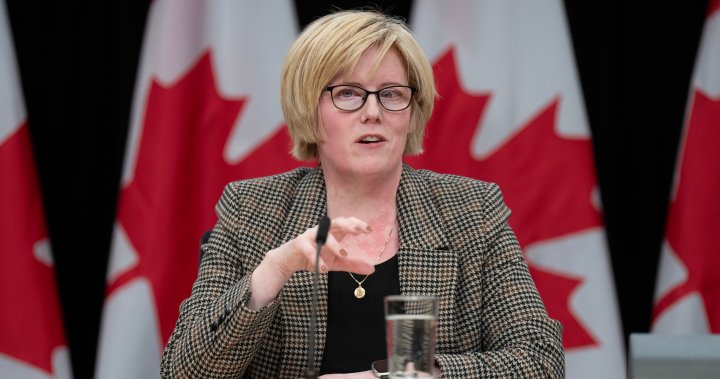Canada’s sports minister announced a national commission to delve into safe-sport problems, but stopped short of a public inquiry.
Carla Qualtrough unveiled several measures Monday in Ottawa, including a Future of Sport in Canada Commission that will hold a summit and produce two reports during its 18-month mandate.
A commissioner, who will be a legal expert and external to the sport system, and two advisers will head it.
“The starting point for the commission will be a recognition that bad things have happened and continue to happen in Canadian sport,” Qualtrough said.
She estimated the commission’s cost to be between $10 million and $15 million. Qualtrough is scheduled to provide a briefing to the House of Commons heritage committee Tuesday.
She was reappointed sports minister this year after her first stint in the portfolio between 2015 and 2017.
The lawyer and visually impaired former Paralympic swimmer returned to the file amid what she and predecessor Pascale St-Onge call a safe-sport crisis.
“Abuse in sport, maltreatment, unsafe sport is absolutely a crisis in this country and that’s why we’re moving forward with this commission,” Qualtrough said.
There have been calls from several quarters, including the House standing committee on the status of women, for a national public inquiry.
An inquiry operates under terms set in the Inquiries Act and requires cabinet approval. Often led by judges, commissioners have power to subpoena witnesses, take evidence under oath and request documents.
Qualtrough compares the sport commission’s work to that of the Truth and Reconciliation Commission, which between 2007 and 2015 investigated harm caused by residential schools, and proposed both solutions to that harm and prevention of further abuse of Indigenous Peoples.
“A public inquiry has its benefit in certain contexts, but the formality and legal rigidity of that type of process didn’t lend itself to the concerns that I have around making sure it’s a safe place for victims and survivors,” Qualtrough said.
“Sport is primarily a provincial jurisdiction and we would have to spend a lot of time negotiating terms of references, and process details with the provinces and territories that could take a year before that negotiation concluded.
“A two-year process that could result in a finding that bad things happen in sport, I’ll stipulate bad things happen in sport. We do not want cross-examination of victims, we do not want people to have to prove they were traumatized.”
Athletes testified in parliamentary committee hearings in 2022 and early 2023 about physical, mental and sexual abuse they experienced in their sport.
MPs were told the pressure on national sports organizations to produce medals, and get funding to do that, contributed to toxic environments in which athlete welfare took a back seat.
Revelations that Hockey Canada had reached a settlement with a woman alleging she was sexually assaulted by members of the 2018 Canadian junior men’s hockey team at a gala, and that Hockey Canada used a portion of registration fees to pay out such settlements, amplified calls for sport culture change.
Former gymnasts Kim Shore, Amelia Cline and Abby Spadafora testified at parliamentary hearings and are members of Gymnasts for Change Canada that lobbied for an inquiry.
“We are disappointed the minister did not support survivors’ and advocates’ calls for a national inquiry that meets judicial standards with the power to compel documents, and subpoena testimony from organizations,” the organization said Monday in a statement.
“We intend to continue advocating to ensure this newly announced review is robust, completely independent from sport actors, who created the current failing system, and scrutinizes leading sport organizations and funding bodies.”
Bruce Kidd, professor emeritus of sport and public policy at the University of Toronto and an Olympic distance runner in 1964, felt Qualtrough’s approach was prudent because it can build on work that’s already been done.
“The proof will be in the pudding of course,” Kidd said. “I applaud the approach. Instead of going back, it’s going forward.
“It’s not a judicial inquiry, which I always objected to. It’s a study ? of the problems and how to fix them. It’s not just maltreatment and abuse. It’s governance, it’s finance, it’s priorities.”
Scholars Against Abuse in Canadian Sport was another proponent of a public inquiry.
“A lot of people wanted a national inquiry and the rigour that comes with that, but at the same time there’s progress here and there’s movement on the government’s side toward acknowledging there is a real serious systemic problem with our sport system and it’s going to take a significant amount of resources to fix it,” said Western University professor MacIntosh Ross.
Among other measures Qualtrough announced Monday:
— Moving the new Office of the Sport Integrity Commissioner and its abuse-free program out of the Sports Dispute Resolution Centre of Canada.
— Increasing the capacity of AthletesCan, which represents Olympic and Paralympic athletes.
— Elevating Sport Canada’s athlete advisory committee to a ministerial committee reporting to Qualtrough.
— Changing Sport Canada’s funding framework to hold organizations more accountable.
— Developing a sport integrity framework, with policies around match manipulation and safeguarding children.
— Establishing an international work group to share and gain knowledge.


